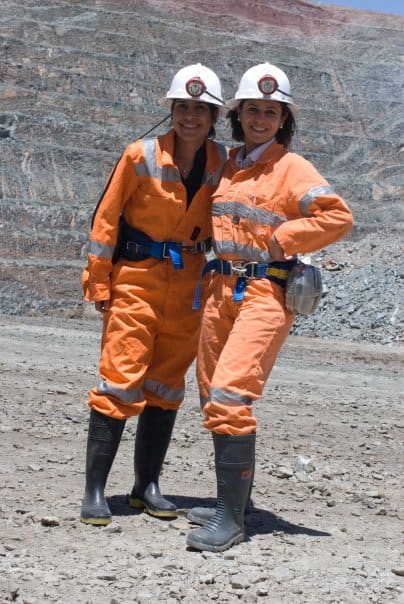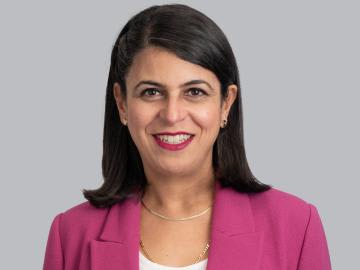Meet Dr. Rita Choueiri - Director, R&D Tax
Whilst some take years to figure out what they'd like to do as a career, there was no doubt in Dr. Rita Choueiri's five-year-old mind that it would have something to do with science.
Armed with a degree in Chemistry and a PhD studying advances in Rare Earth Complexes, Rita has experienced the thrills of being a scientist including working on a highly secretive project at BHP and having to take the occasional emergency shower following an unexpected explosion (or two) - all in the line of work, of course!
Rita shares candidly about her adventures through the world of science and how it continues to guide her work today as an adviser to businesses and their R&D Tax Incentive applications.
BACK IN SCHOOL, WHAT DID YOU WANT TO BE WHEN YOU GREW UP?
Ever since I was about five, I knew I wanted to be a scientist. I was a Curiosity Show addict. I would video tape it and watch the tape on repeat and attempt some of the experiments at home. And of course, Beyond 2000 gets a special mention, but that came later on.
My dad also had an influence on my love of science as he of course introduced me to The Curiosity Show and Beyond 2000 and from a young age, would spend time explaining how things worked. He had wanted to become a scientist but wasn't fortunate enough in his home country to follow his passion. He then later came out to the land of opportunity, Australia, from Lebanon in 1970 and worked hard to give me and my brothers the education and opportunities he never had. My siblings and I all became scientists and engineers. One brother studied computer science and the youngest one became a civil engineer.
WHAT DID YOU STUDY AT UNI?
I did a Bachelor of Science (Hons) with a double major in chemistry. My Honours thesis involved researching and developing anticancer drugs based on cisplatin /carboplatin.
I then studied a Doctor of Philosophy. My PhD thesis was on Advances in Rare Earth Complexes. Most rare earths are extremely reactive so most of my work was carried out in glove boxes, or in environments in absence of air, which made the chemistry challenging but very exciting.
I studied both degrees at Monash University but did one year of my PhD at The University of California, Irvine on a Fulbright Scholarship.
For some bedtime reading, you can view my thesis and publications here:
WHAT ARE SOME OF THE MEMORABLE ROLES IN THE SCIENTIFIC SPACE THAT YOU’VE HELD?
Working on a top-secret project at BHP at the time called Project Snowstorm. My labs even had newspaper up on the windows so no other BHP staff could see in. We were developing a titanium pilot plant and my role was to study the extraction of titania from ilmenite sand.
And of course, every chemist has a story of the explosion and fire they've caused. Going under the emergency shower to wash chemicals off you after an explosion isn't the most pleasant experience if you don't have a change of clothes.
WHAT DO YOU LOVE ABOUT SCIENCE AND TECHNOLOGY?
It gives you the understanding of how and why things work, and that knowledge gained allows advances in all aspects of society. It's really what drives and motivates me. Knowing that the work I do to assist companies with their R&D Tax Incentive claims contributes to the advancement of science and technology indirectly by helping these companies receive funding to continue to innovate and grow.
IN YOUR CURRENT ROLE, HOW DO YOU APPLY YOUR SCIENCE KNOWLEDGE?
We have to interview scientists and engineers and describe the experiments that companies undertake for R&D Tax Incentive applications in quite a lot of detail. Having a scientific background helps to build rapport with the scientists and engineers and assists with our ability to read and interpret scientific information, ask the right questions, comprehend the information the scientists/ engineers we interview explain and write the experiments up.
YOU’VE GOT TWO YOUNG KIDS. HOW IMPORTANT IS SCIENCE TO THE CONVERSATIONS YOU HAVE WITH THEM AT HOME?
STEM is no doubt the future, so I'm always explaining to my daughters the opportunities it brings and future job prospects. I think having an understanding of computer science and coding will be important going forward as all industries will be driven by software.
IF YOU WEREN’T IN THIS LINE OF WORK, WHAT WOULD YOU LIKELY BE DOING?
If I wasn't in R&D Tax Incentives, I would have headed up R&D operations for a company or become a Patent Attorney.
If I wasn't in science at all, I'd be a fashion designer. In high school, physics clashed with textiles (because apparently no one ever selects physics and textiles together, go figure) in VCE so there ended my pursuit of working in fashion. I did however get the fashion design itch out of my system and created a company to sell handbags I designed. A few boutique stores sold them but when it all got too difficult with a young baby at the time and my actual work, I let it go. One day, I'll pick up where I left off as a hobby.


